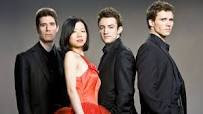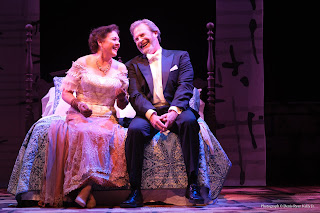Escher String Quartet ascends to the heights of Beethoven in Ensemble Music concert
 |
| The Escher String Quartet offered two Viennese classics plus Ades. |
There was plenty of spirit, plus an admirably robust sound, which prevailed throughout the work. Presented by Ensemble Music Society, the American ensemble, in residence at Southern Methodist University in Dallas, projected a variegated, sympathetic concept of Haydn at the top of his form in the genre he practically invented.
The large audience in the Basile Auditorium of the Indiana History Center took to the Eschers immediately as a result. The warm rapport thus established helped sustain its obvious fascination with the late-20th-century piece that followed, "Arcadiana" by Thomas Adès. The English composer wrote this at the beginning of an illustrious career that has carried him to the forefront of contemporary music in the United Kingdom.
The seven-movement suite presents an astonishing variety of idealistic evocations of
 |
| The French artist Poussin painted "Et in Arcadia ego" in 1637-38. |
It's remarkable that so young a composer was able to reach out to so many styles of musical expression and fold them into his own language. The hints of older music, sometimes approaching quotation, seem much more successfully bound into something fresh than a few American composers (George Rochberg and Jacob Druckman, for example) achieved while high modernism, keyed to serialism, began breaking down as orthodoxy several decades ago. The wispy phrases of the finale, "Lethe," toy with the polarity of memorability and forgetfulness — an opposition that gives substance to all journeys we may undertake to Arcadia away from this life.
 |
| M.C. Escher's "Relativity": Games of perspective |
The Eschers lived up to the Dutch artist they honor in their name with the well-knit manner in which they addressed the complexity of perspectives in this work. And all three of the pieces presented harness the centrifugal forces within them to produce coherent narratives, on all of which this quartet shone a bright light. Unanimity of concept and execution characterized the concert, though the Escher lacked the exquisite, unshakable balance of the Danish String Quartet that EMS presented last month.
The most extensive illustration of the Eschers' estimable skills came after intermission. It was Beethoven's Quartet in A minor, op. 132. The formally innovative work features a lengthy slow movement illustrating the composer's gratitude at recovery from a severe health crisis reflective of the horrendous burdens besides deafness that bedeviled Beethoven late in life.
The changing meaning of the two-part process of devout thankfulness and regained strength as the movement proceeds is vital to any performance. The Eschers showed themselves remarkably patient about illuminating the transformation of the two themes into a conclusive outpouring of gratitude.
The other four movements also had a complementary vigor and unhurried tension and release about them. Though the ovation was sustained and vigorous at the end, there seemed to be a general understanding that no encore was needed or even appropriate after such a performance of such a work.



Comments
Post a Comment